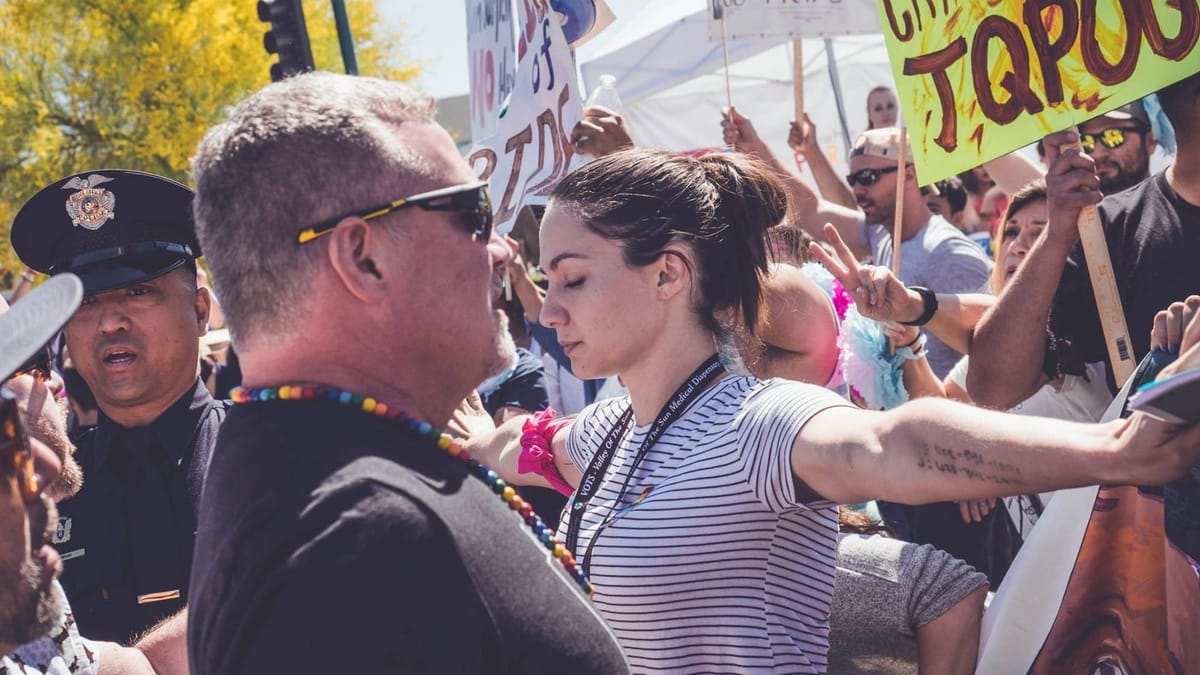Phoenix LGBTQ+ Community Suspicious After Sports Tournament Broken Up by Park Ranger, Police
Excessive intervention by police officers and a Phoenix park ranger during an LGBTQ+ sports tournament Sunday night left players uneasy and confused.
Interviews with 24 people show consistent concerns about Phoenix Pride.
PRIDE FESTIVALS: This past weekend was the Phoenix Pride Festival, where we engaged with hundreds of people to learn their interests and what they wanted from local news.
That's how we get most of our story ideas, actually; we rely heavily on people coming to us to explain what's going on inside and outside the community, and then we try and dig in. In essence, we view our role as a news organization similar to an ombudsman.
So when a handful of people reached out a few months ago about concerns surrounding Phoenix Pride's ticket price, their entertainment choices, and the continued use of police inside the festival both as peacekeepers and at a booth, we decided to dig in a bit more.
Over the course of three months, we spoke to 24 people who worked with Pride, have been volunteers, or are regular festival-goers who stopped attending in recent years. We asked them all a very basic question: what do you want from your local Pride organization?
The answers varied, from finding a festival location that wasn't gated and hidden away from the general population, to more advertising of local talent.
But across all 24 people, there were three consistent concerns: all of them said Pride festivals should be free to attend and that the organization needs to engage more with the community, while a large majority believed police presence at the festival should be reduced even more.
It's a nuanced piece of reporting. Pride said there are some bureaucratic problems they simply would never be able to do. And while everyone agreed Phoenix Pride is important, they all said there is room for improvement.
Read our full story here:

LOOKOUT'S TAKE: These kinds of complaints against Pride aren't new, and Phoenix Pride is just one of dozens of Pride organizations nationwide that have had to deal with reckonings from their community.
Even the parade's Grand Marshal Chef Silvana Salcido Esparza, who recently retired as the owner of Barrio Cafe, posted on Instagram critiquing Phoenix Pride for their parade choices (she reposted a video of someone criticizing Amazon's float leading the march). She captioned the post: "Pride has changed."
In other cities, there has been a growing call for grassroots Pride parades as an alternative, also referred to as "anti-Pride" marches.
They involve Trans Marches, Drag Marches, Black Pride Marches, and Disability Pride Marches. They all evolved from the same complaint: the local Pride organization wasn't doing enough.
Phoenix, it seems, is far from that kind of internal uprising. Even though there have been protests at Phoenix Pride by queer people in the past, there appears to be time for Phoenix Pride to engage with Phoenix's LGBTQ+ community before an all-out rebellion.
The question on most people's minds, though, is if the community is willing to engage with Phoenix Pride. And if they do, will they be heard?
LOOKOUT Publications (EIN: 92-3129757) is a federally recognized nonprofit news outlet.
All mailed inquiries can be sent to 221 E. Indianola Ave, Phoenix, AZ 85012.